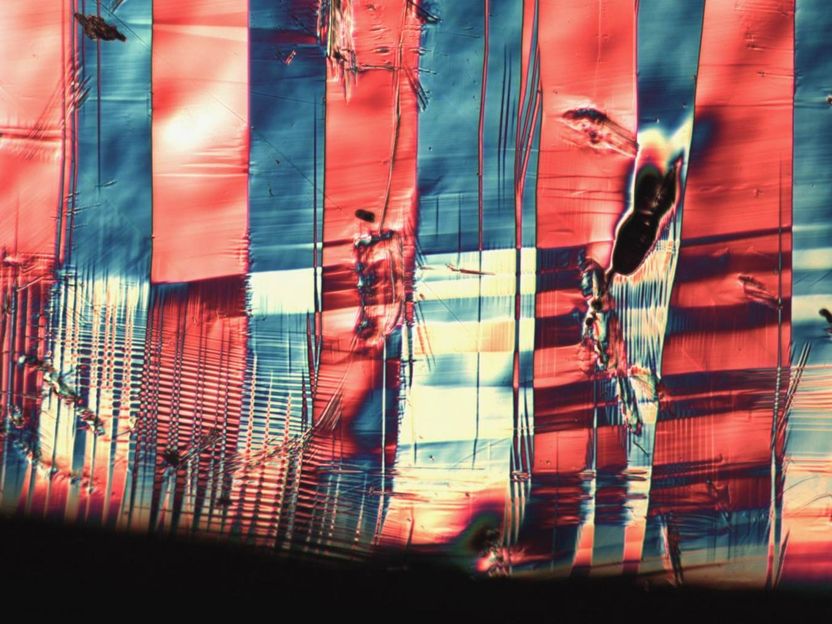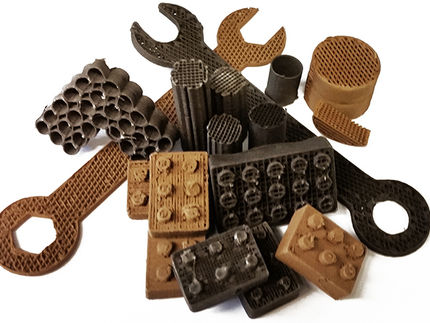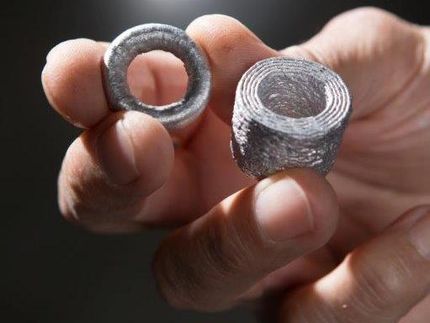Printing a better actuator, actually
One technology uses magnetic fields to generate mechanical work. The other enhances the magnetic properties of 3D-printed materials. Combined, they could lead to efficient, economical production of magnetic actuators used in everything from sensors, robotics, and mechanical devices to power generation. An award from the National Science Foundation (NSF) has researchers at the University of Pittsburgh playing matchmaker to determine if this magnetic union will attract or repel.

Examples of twinning (colorful bands) in magnetic shape-memory alloy single crystals. During actuation, some twins will grow and some will shrink depending on the direction of the applied magnetic field. This will result in an overall shape change and stroke useful in actuators
Swanson School of Engineering/Markus Chmielus
The NSF awarded Markus Chmielus, assistant professor of mechanical engineering and materials science at Pitt's Swanson School of Engineering, $296,169 to research how magnetically-enhanced binder jet printing affects the microstructure and properties of magnetic shape-memory alloys. Dr. Steven Ludwick, who works at motion-control product manufacturer Aerotech in Pittsburgh, Pa., is Co-principal Investigator.
"Magnetic-field-enhanced binder jet printing is a type of additive manufacturing that uses a magnetic field to align powder particles during printing," says Dr. Chmielus. "This process will enhance structural and magnetic anisotropy--a property that defines how much the material will react to magnetic activation."
Magnetic shape-memory actuators naturally change shape in the presence of a changing magnetic field. The actuator will remain in its shape when the field is removed but can be reversed by changing the direction of the magnetic field. This natural shape-memory effect can also act as the power source, which is very beneficial for designing small parts without heavy onboard batteries or devices that need to be operated remotely. Though they may be convenient, they're also expensive.
"Currently, the best performing magnetic shape-memory alloys are made out of single crystals," explains Dr. Chmielus. "These single crystals are rather difficult and costly to make. With magnetic-field-enhanced binder jetting, we aim to improve the properties of magnetic shape-memory alloys that are not single crystals but made out of powder, so that they reach near single crystal properties."
Through the process of layering powder and a binding liquid, binder jet printing could lower the price of magnetic shape-memory alloys and open up new possibilities for magnetic actuators in manufacturing, robotics, medical devices engineering, and a variety of other industries.
"We are mainly focused on research that will establishes binder jet printing as a superior manufacturing technique for these functional materials. If this kind of AM is possible, more intricately-shaped actuators can be designed for things like robotic hands, parts grippers, or foldable solar panels. They could complete more complex actuation sequences and be molded to perfectly grasp their target objects," says Dr. Chmielus.
The study, "GOALI: From Powder to Functional Actuators: Binder Jet Printing of Magnetic Shape Memory Alloys," is part of the NSF Grant Opportunities for Academic Liason with Industry (GOALI) program. The program encourages interaction between academic research institutions and industry.
"At both Pitt and Aerotech, we will work on the evaluation and comparison between single crystal and binder jet-printed functional materials. I am working on the fundamental research aspect of this proposal--an understanding of how powder size and shape, printing, magnetic alignment, and processing affects microstructure and functional properties. Steven is working on actuator designs that would utilize these magnetic shape-memory alloys in either single crystal form or printed form," Dr. Chmielus says.
Most read news
Topics
Organizations
Other news from the department science

Get the chemical industry in your inbox
By submitting this form you agree that LUMITOS AG will send you the newsletter(s) selected above by email. Your data will not be passed on to third parties. Your data will be stored and processed in accordance with our data protection regulations. LUMITOS may contact you by email for the purpose of advertising or market and opinion surveys. You can revoke your consent at any time without giving reasons to LUMITOS AG, Ernst-Augustin-Str. 2, 12489 Berlin, Germany or by e-mail at revoke@lumitos.com with effect for the future. In addition, each email contains a link to unsubscribe from the corresponding newsletter.
Most read news
More news from our other portals
Last viewed contents
Sirtex
Chlorzoxazone
Aloin
Category:Decongestants
Acetanilide






























































